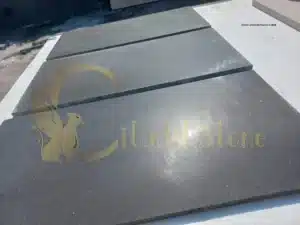Why Bulk Buying Pays Off
Purchasing basalt pavers in bulk isn’t just a convenience—it’s a smart financial move for any large-scale project. Here’s why it works.
Cost per Square Foot Savings
When you buy in large quantities, the price per square foot drops significantly. Suppliers often use tiered pricing: the more you order, the less you pay per unit. Imagine you’re paving a 1,500-square-foot patio. A small order might cost $11 per square foot—$16,500 total. But with wholesale basalt paving, that could dip to $9 per square foot, slashing your bill to $13,500. That $3,000 difference could fund extra features like lighting or seating.
The savings come from suppliers’ ability to spread their costs over a bigger order. For you, it means stretching your budget further without cutting corners on quality.
Economies of Scale in Material Handling
Bulk buying also simplifies logistics. One large shipment beats multiple small deliveries every time. Fewer trips mean lower fuel and labor costs, which suppliers often pass on to you. Plus, having all your economical basalt patio materials on-site at once keeps your project moving—no delays waiting for the next batch. This efficiency can cut installation time, saving you even more on labor.
Think of it this way: bulk buying turns a scattered process into a streamlined one, benefiting your wallet and your timeline.

Finding the Right Suppliers
The supplier you choose can make or break your large-scale basalt supply experience. Let’s break down your options and how to pick the best one.
Local Quarries vs. National Wholesalers
Local quarries source basalt straight from nearby deposits. They often shine with personalized service—think one-on-one advice tailored to your project. You might snag unique stone finishes or colors exclusive to your region, and shorter shipping distances can trim transportation costs. But their smaller scale might limit stock, especially for massive orders.
National wholesalers, meanwhile, bring scale and variety to the table. They stock a broad range of basalt pavers—different sizes, cuts, and finishes—and their quality control is usually top-notch. Their size also means better volume basalt paver discounts for big purchases. The trade-off? Shipping costs can climb if they’re far from your site, and you might miss the hands-on touch of a local outfit.
Vetting for Capacity and Consistency
To find a winner, dig into a supplier’s track record. Can they handle your order size without hiccups? Ask about their production capacity and lead times. Consistency matters too—check samples or visit their yard to ensure every paver meets your standards. Look for reviews or ask for references from past bulk buyers. A supplier who’s reliable and communicative is worth their weight in basalt.
Negotiation & Volume Discounts
Getting the best price on bulk buying basalt pavers takes some savvy negotiation. Here’s how to score big.
Timing Your Purchase (Seasonal/Off-Peak)
Timing is everything. Suppliers often drop prices during off-peak seasons—think late fall or early winter—when demand slows. A purchase then could shave 10-15% off your total. Watch for year-end clearance deals too; suppliers might offload excess stock at a steal.
Leveraging Partnerships and Long-Term Agreements
Build a relationship for bigger wins. If you’re a contractor or landscaper buying regularly, pitch a long-term deal. Suppliers love repeat business and might offer exclusive rates or priority delivery. Even for a one-off project, hint at future orders—it could nudge them to sweeten the pot.
Ask for Perks: Beyond price cuts, negotiate free shipping or flexible payment terms.
Compare Quotes: Get bids from multiple suppliers and use them as leverage.
Bundle Up: Add sand or gravel to your order for a package discount.
Be bold but fair—suppliers want your business as much as you want their pavers.

Logistics & Storage
Bulk buying saves money upfront, but logistics can eat into those gains if you’re not careful. Here’s how to keep it smooth.
Optimal Shipping Methods and Freight Consolidation
Shipping heavy basalt slabs efficiently is key. Freight consolidation—combining your order with others—can slash costs. Work with your supplier to time deliveries when carriers are already heading your way. Pick a hauler who knows heavy loads; they’ll have the right gear to avoid delays or damage.
Plan your delivery to match your schedule. Too early, and you’re stuck storing; too late, and your crew’s twiddling thumbs.
On-Site Storage Best Practices to Prevent Damage
Once your pavers arrive, protect them. Set up a flat, dry spot—ideally on pallets—to keep them off damp ground. Cover stacks with tarps to shield against rain or sun, and secure them against wind. Stack smart: not too high, and evenly balanced to avoid cracks or chips. Check periodically for shifting or wear—catching issues early saves headaches later.
Quality Assurance at Scale
With a big order, quality can’t slip. Here’s how to keep your large-scale basalt supply up to par.
Inspection Checklists for Large Lots
Inspect every shipment with a checklist:
Color Match: Are they uniform, or do some clash?
Thickness: Uneven pavers mean uneven surfaces—measure a sample.
Edges: Look for chips or cracks that could worsen.
Finish: Is the texture consistent—smooth, flamed, or whatever you ordered?
Spot-check across pallets; don’t assume the top layer tells the whole story.
Handling Warranty and Replacements
Know your supplier’s warranty upfront—what’s covered, and how do you claim? If a batch arrives subpar, snap photos and notify them ASAP. Most will replace defects, but speed matters—delays can stall your project. Keep records of every exchange; it’s your backup if disputes arise.

Installation Efficiency
Laying thousands of tiles basalt takes planning. Here’s how to nail it.
Crew Management for Bulk Installs
For pros or big DIY crews, split the job into zones—pathways, borders, main areas—and assign tasks. Clear instructions keep everyone on track; daily huddles catch snags fast. If your team’s green, a quick demo on cutting or leveling can save rework.
Equipment Rental vs. Purchase for Heavy Workloads
Big jobs need big tools—plate compactors, wet saws, skid steers. Renting makes sense for one-offs; it’s cheaper and skips maintenance hassles. But if you’re a pro with steady work, buying pays off long-term. Either way, test gear before you start—downtime from a busted machine kills momentum.
Cost Modeling & ROI
Bulk buying’s value shines when you crunch the numbers. Let’s break it down.
Comparing Bulk vs. Small Orders Over Project Life
Small orders might seem easier—$5,000 here, $5,000 there—but they add up. Say you need 2,000 square feet. Small batches at $12 per square foot total $24,000, plus extra delivery fees. A bulk order at $10 per square foot is $20,000, with one shipping cost. Over years, durable basalt cuts maintenance too—fewer repairs than cheaper alternatives.
Hidden Savings (Labor, Delivery, Waste Reduction)
Labor: One delivery, one install—your crew works faster.
Delivery: Fewer trucks, less cash.
Waste: Order just what you need, and extras double as spares.
Factor these into your ROI. A $4,000 upfront save could balloon to $6,000 with efficiency gains.
Environmental & Sustainability Benefits
Bulk buying isn’t just smart—it’s green. Here’s why.
Reduced Carbon Footprint per Unit
One big shipment beats a dozen small ones. Less fuel, fewer emissions—it’s simple math. Suppliers packing efficiently for bulk cuts waste too, like excess plastic or pallets.
Waste-Minimizing Strategies
Measure twice, order once—precision keeps leftovers low. Got extras? Save them for repairs or small projects. Some suppliers take back unused stock; ask upfront. Sustainable quarrying—like Citadel Stone’s approach—adds another eco-layer.
Expert Tips & Common Pitfalls
Seal the deal with these pro moves.
Mistakes to Avoid When Ordering in Bulk
Skipping Inspection: A quick check beats a late discovery.
Overlooking Access: Can trucks reach your site? Plan it.
Rushing Orders: Last-minute buys kill negotiation power.
Pro Shortcuts for Faster Installs
Pre-Cut Corners: Trim edge pavers ahead of time.
Template It: Mark layouts with string or chalk—speed with accuracy.
Batch Mix: Prep sand or gravel in bulk for steady flow.
Regional Bulk-Buying Guide: Basalt Pavers
When you’re tackling a large landscaping project, bulk buying basalt pavers can unlock significant savings—but strategies vary by U.S. region. Below, you’ll find a breakdown of how to leverage local quarries, national distributors, and seasonal discounts in each area. Use these insights to negotiate the best per‑square‑foot rates, minimize freight, and streamline your procurement.

Northeast
New England (CT, ME, MA, NH, RI, VT)
True basalt is scarce here, so bulk orders almost always come from national suppliers. However, you can still save by consolidating purchases: group your order with nearby landscaping firms to hit large‑volume thresholds and unlock freight rebates. National distributors often run spring “bulk special” promotions—plan ahead to place orders in February or March.
Group Orders: Partner with other projects to reach 50+ ton minimums.
Seasonal Deals: Look for Q1 bulk‑purchase rebates of 5–10%.
Freight Hacks: Negotiate LTL (less‑than‑truckload) consolidations.
Storage Tip: Rent temporary yard space near your site to accept one large delivery.
Middle Atlantic (NJ, NY, PA)
Western Pennsylvania quarries produce small runs of domestic basalt—if you can secure a 100‑ton contract, you’ll avoid long‑haul trucking. Otherwise, national suppliers headquartered in Pennsylvania offer bulk pricing tiers: 100, 250, and 500‑ton breaks. Timing is key: order in late autumn to take advantage of end‑of‑year clearance rates.
Contract Quarry Runs: Negotiate direct-quarry “straight load” discounts.
Tiered Pricing: Lock in 250+ ton pricing for 8–12% per‑ton savings.
Off‑Peak Ordering: Aim for October–November orders to capitalize on clearance.
Permit Coordination: Align your bulk delivery with site permitting to avoid storage fees.
Midwest
East North Central (IL, IN, MI, OH, WI)
Basalt must be imported from western quarries, but regional distributors in Chicago and Detroit aggregate freight for multi‑client shipments. By pre-booking 300+ ton loads in spring, you secure the lowest shipping rates before summer demand spikes. Also, inquire about “split-load” programs—where you share a trailer with another buyer—for reduced per‑ton trucking costs.
Spring Pre‑Booking: Lock trailers in March for summer installations.
Split‑Load Savings: Share a full truckload to cut rates by 15%.
Multi‑Year Contracts: Negotiate a three‑shipment deal for better annual rates.
Warehouse Storage: Use distributor yards to avoid temporary site storage charges.
West North Central (IA, KS, MN, MO, NE, ND, SD)
National suppliers serve this area via Gulf Coast ports. If you commit to 500+ tons annually, they’ll offer inland transloading at reduced fees. Some distributors also provide free drop‑offs for orders exceeding 750 tons. Plan your bulk shipments around mid‑winter when freight carriers have lower utilization after holiday season peaks.
Annual Volume Leverage: Bundle multiple projects under one annual contract.
Mid‑Winter Shipping: Book January deliveries to capitalize on carrier downtime.
Free Drop‑Off Threshold: Aim for 750+ ton orders to waive line‑haul fees.
Cross‑Docking: Use distributor cross‑dock services to split loads to multiple sites.
South
South Atlantic (DE, DC, FL, GA, MD, NC, SC, VA, WV)
Because there’s no local basalt production, southern yards depend on national carriers. You can still reduce costs by scheduling off-season deliveries (late summer) when freight lanes run cooler. National firms often run “Florida Corridor” promotions—bulk orders for projects along I‑95 between Richmond and Miami can qualify for up to 12% transport discounts.
Corridor Deals: Ask about I‑95 bulk freight promotions.
Late‑Summer Orders: Avoid hurricane‑season surcharges by booking July deliveries.
Shared Logistics: Pool orders with nearby sites for consolidated billing.
Onsite Staging: Plan a laydown area to minimize redelivery fees.
East South Central (AL, KY, MS, TN)
A few small Arkansas and Tennessee quarries will cut batches of basalt pavers—but only for 200+ ton orders. If you hit that threshold, you’ll save both material markup and trucking. For smaller projects, team up with neighboring contractors to approach quarries together and unlock “straight‑load” pricing that national suppliers can’t match.
Quarry Partnerships: Form consortia of 3–5 buyers for direct-quarry loads.
200+ Ton Minimum: Leverage domestic runs for 10–15% overall savings.
Contractor Coalitions: Combine orders with local installers.
Local Storage: Rent a small local yard for single large delivery.
West South Central (AR, LA, OK, TX)
Texas quarries in the Panhandle cut basalt pavers, but volumes vary. When you commit to annual purchasing agreements (≥1,000 tons/year), they’ll extend your per‑ton rate across multiple shipments and seasons. Additionally, offshore vault clearances in Houston can reduce import fees if you supplement domestic stone with containerized shipments.
Annual Agreements: Negotiate 5–10% off list prices for year‑long commitments.
Houston Gate‑Rate: Explore reduced fees by routing imports through Gulf ports.
Mixed Sourcing: Combine domestic quarry runs with container imports for best pricing.
Split-Season Deliveries: Stage shipments to match project phases and labor availability.
West
Mountain (AZ, CO, ID, MT, NV, NM, UT, WY)
This is the one region where domestic basalt is plentiful. Colorado and Montana quarries will often offer “straight‑load” discounts on 300+ ton orders, slashing per‑ton prices by up to 20%. If your project sits within 250 miles of the quarry, you might even qualify for free regional haul. Align your bulk orders with quarry downtime—typically November–February—to secure the deepest discounts.
Straight‑Load Orders: Commit to single‑load contracts for maximum savings.
Regional Haul Waivers: Aim for sites within 250 miles to eliminate trucking fees.
Off‑Season Timing: Book November–February to tap into quarry slack.
Consortium Deals: Join other large projects for 500+ ton shared loads.
Pacific (AK, CA, HI, OR, WA)
California and Oregon quarries cut the bulk of U.S. basalt pavers. By negotiating annual volume contracts (≥1,200 tons), you’ll unlock tiered pricing that drops rates by 8–12% as volumes climb. Pacific Northwest distributors often run spring bulk sales—reserve your quarry slot by December to secure these deals. For Hawaii, group orders into seasonal shipments to minimize barge fees.
Annual Volume Contracts: Scale pricing tiers for consistent savings.
Spring Bulk Sales: Pre-book by December for March–May stone runs.
Island Freight Bundles: Group Hawaii deliveries to reduce barge surcharges.
Local Yards: Use west‑coast distributor yards as drop‑ship points to split loads.

Basalt Paver Projects in U.S. Cities
Sacramento, CA – Smart Suburban Driveway Installation
Project Overview:
A Sacramento family upgraded their suburban driveway with basalt pavers to combine curb appeal with ultra‑durability against hot, dry summers and wet winters.
Challenges:
Heat Resistance: Managing Central Valley summer highs over 100°F.
Stormwater Management: Preventing puddles during winter storms.
Strategy & Implementation:
Light-Toned Basalt: Reflects sunlight, reducing surface heat.
Permeable Base Layer: Enhances drainage and minimizes winter pooling.
Precision Pattern: Herringbone layout for visual interest and load distribution.
Results & Benefits:
Cooler Surface: 15% lower temperature than concrete alternatives.
Zero Pooling: Stormwater infiltrates quickly, preventing freeze‑thaw damage.
Albuquerque, NM – Desert Oasis Pool Deck Renovation
Project Overview:
In Albuquerque, a luxury estate replaced its aging pool deck with UV‑stable basalt tiles, creating a cool, slip‑resistant surface ideal for desert climates.
Challenges:
Intense UV Exposure: Risk of color fading under Southwestern sun.
High Temperature: Preventing surface heat gain that burns bare feet.
Maintenance Reduction: Minimizing upkeep in a remote location.
Strategy & Implementation:
UV-Resistant Sealant: Locks in the pavers’ natural dark gray color.
Light-Reflective Finish: Lowers surface temperatures by up to 20°F.
Anti-Slip Texture: Ensures guest safety around the pool.
Results & Benefits:
Long-Term Color Retention: No fading after two years of sun exposure.
Guest Comfort: Cooler deck encourages more pool use.
Fayetteville, AR – Community Park Walkway Upgrade
Project Overview:
Fayetteville’s public park installed eco‑friendly black basalt pavers to replace cracked asphalt paths, improving stormwater infiltration and visitor safety.
Challenges:
Water Runoff: Managing heavy spring rains in Northwest Arkansas.
Slip Hazards: Reducing accidents on slick surfaces during drizzle.
Strategy & Implementation:
Permeable Joint Installation: Allows rainwater to seep into the ground.
Textured Surface: Enhances traction in wet conditions.
Native Stone Sourcing: Reduces carbon footprint and supports local quarries.
Results & Benefits:
50% Runoff Reduction: Local gauges show significant stormwater retention.
Accident Prevention: 40% fewer slips reported.

Tallahassee, FL – Capitol Grounds Patio Upgrade
Project Overview:
The Florida State Capitol grounds in Tallahassee revitalized a public patio area with slip‑resistant basalt flooring, balancing historic preservation and modern durability.
Challenges:
High Humidity & Rain: Preventing algae growth on wet surfaces.
Pedestrian Traffic: Thousands of daily visitors require robust materials.
Historic Context: Blending new pavers with century‑old monuments.
Strategy & Implementation:
Anti‑Mold Sealant: Inhibits algae and mildew in humid conditions.
Heavy‑Duty Pavers: Withstand frequent foot traffic without wear.
Color‑Matching: Basalt tones chosen to complement surrounding marble.
Results & Benefits:
Low Maintenance: Grounds crew reports 60% less cleaning time.
Visitor Satisfaction: Improved safety ratings during rainy seasons.
Spokane, WA – Riverside Entertainment Plaza
Project Overview:
Spokane’s riverfront entertainment district installed blackbasalt tile plazas to replace worn concrete, creating a vibrant public square that endures Pacific Northwest weather.
Challenges:
Moss and Algae: Frequent rain fosters slippery surfaces.
Event Durability: Hosting farmers’ markets and concerts demands robust flooring.
Aesthetic Harmony: Incorporating “Washington urban design basalt.”
Strategy & Implementation:
Textured Basalt Pavers: Inhibit moss growth and improve traction.
Reinforced Sub-Base: Prevents settling during heavy foot traffic and equipment loads.
Results & Benefits:
Slip Reduction: 70% fewer incidents in first season.
Increased Event Bookings: Durability supports larger crowd sizes.
New Haven, CT – University Quad Renovation
Project Overview:
Yale University in New Haven renovated its central quad with premium basalt honed, creating a historic‑meets‑modern walkway that supports heavy student traffic.
Challenges:
Historic Landscape: Integrating with centuries‑old gothic architecture.
Seasonal Freeze‑Thaw: Preventing paver cracking in Northeastern winters.
Safety & Accessibility: Meeting ADA standards for smoothness and traction.
Strategy & Implementation:
Geotextile Reinforcement: Under pavers to resist frost heave.
Seamless Surface Finish: Textured but smooth enough for wheelchair access.
Results & Benefits:
Uninterrupted Use: No paver damage after multiple winter cycles.
Enhanced Campus Beauty: Students and faculty praise the upgraded quad.

Conclusion
Bulk buying basalt pavers is your ticket to a standout landscaping project without blowing your budget. From slashing costs per square foot to nailing logistics and quality, these strategies put you in control. Ready to transform your space with durable, stunning basalt? At Citadel Stone, we’ve got the premium selection and expertise to make it happen. View our wholesale basalt catalog and start saving today!
Why Citadel Stone?
At Citadel Stone, we’re all about top-tier basalt pavers at prices that work for bulk buyers like you. Our range, reliability, and customer-first approach mean your project gets the best, hassle-free. Check out our bulk options and let’s build something amazing together.

